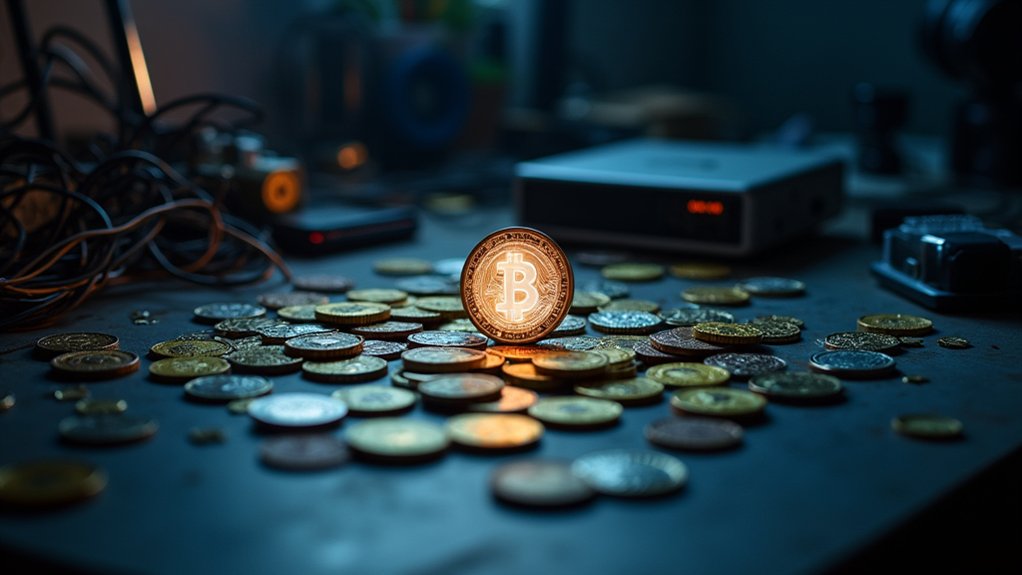Community governance in altcoin projects, often peddled as decentralized utopia, hides a cesspool of competing interests and sly power grabs, where whales drown out smaller voices. Don’t swallow the transparency hype; most projects cherry-pick data, mask inner dealings, and exploit democratic facades to lure naive investors. Ethical claims? Often just bait, with centralization mocking lofty ideals. Accountability isn’t optional—it’s survival. Stick around to uncover the gritty cracks beneath this polished crypto veneer.

The murky world of altcoins, often hailed as the bastion of decentralization, hinges precariously on the concept of community governance—a system that, while promising empowerment, frequently teeters on the edge of chaos. Beneath the glossy rhetoric of stakeholder democracy, where token holders supposedly steer the ship, lies a brutal reality: decision-making often devolves into a circus of competing interests. Transparency, lauded as the holy grail, is supposed to bolster Investor Relations, yet how many projects truly lay bare their inner machinations without cherry-picking data to placate the masses? The facade of inclusivity masks a grittier truth—power often consolidates among the few who can buy influence, leaving smaller voices drowned out.
Dig deeper, and Ethical Considerations emerge as a glaring fault line. Are altcoin projects genuinely committed to fairness, or do they exploit community governance as a marketing gimmick, dangling voting rights like bait to hook naive investors? DAOs, with their shiny smart contracts and on-chain voting, are paraded as revolutionary, yet centralization creeps in—ironic, isn’t it, for a system built on defying authority? Projects like Polkadot and Terra Classic tout community-driven models, but when push comes to shove, are stakeholders truly empowered, or merely pawns in a game of optics? Many altcoins, as forks of Bitcoin or Ethereum, inherit similar governance challenges while attempting to carve out unique purposes (inherit governance challenges). Governance tokens, often central to these systems, play a pivotal role by granting holders the ability to influence critical decisions (governance tokens).
The stakes couldn’t be higher, and the altcoin ecosystem must stop hiding behind buzzwords. Community engagement, while essential, often feels like a performative charade—forums and feedback loops exist, sure, but do they effect real change, or just pacify dissent? Governance tokens promise influence, yet their impact is questionable when whales dominate. With over 13,000 altcoins in circulation, the sheer diversity of projects amplifies these governance struggles (over 13,000 altcoins). If altcoins are to survive, they must confront these contradictions head-on, or risk crumbling under the weight of their own hollow ideals. Accountability isn’t optional; it’s a mandate.
Frequently Asked Questions
How Do Altcoin Projects Fund Community Initiatives?
Altcoin projects fund community initiatives through diverse methods. They utilize Grant Allocation to secure non-dilutive financing from foundations. Additionally, Crowdfunding Strategies engage supporters via token sales and NFT campaigns to raise necessary capital.
What Legal Challenges Face Altcoin Governance?
Altcoin governance encounters significant legal challenges, including Regulatory Hurdles due to inconsistent global laws. Enforcement Actions are complicated by jurisdictional issues and decentralized structures, creating uncertainty and hindering effective legal oversight and compliance.
How Are Disputes Resolved in Altcoin Communities?
Disputes in altcoin communities are addressed through structured Conflict Resolution processes. Mediation Strategies often involve neutral third parties to de-escalate tensions, while direct communication and evidence gathering remain essential for fair resolutions.
What Tools Facilitate Altcoin Governance Participation?
Various tools enhance participation in governance processes. Voting Interfaces like Tally provide seamless ballot casting, while Proposal Systems such as Colony enable structured decision-making, ensuring stakeholders can effectively contribute to project directions.
How Do Altcoins Ensure Voter Anonymity?
Altcoins guarantee voter anonymity by employing robust Privacy Mechanisms and advanced Anonymity Protocols. These systems integrate cryptographic techniques like zero-knowledge proofs and homomorphic encryption, safeguarding individual identities while maintaining transparency in voting processes.









